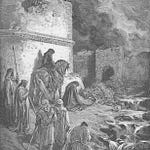
I’m broadly skeptical about consumer activism. The first time I set foot in a Whole Foods, I saw a laminated sign beside the coffee grinder indicating that the machine might have been contaminated by non-organic coffee and that eco-conscious consumers might want to grind their beans at home.
My eyes rolled all the way back in their sockets. I just wanted to go back to Food Lion.
Whole Foods is, of course, a union-busting grocery chain owned by Amazon, a monopolistic company helmed by richest-man-on-earth Jeff Bezos. Jeff Bezos makes something in the ballpark of $9 million per hour via an empire that specializes in online retail, web services for enormous swaths of the internet, and tax dodging.
Amazon owns Audible, Goodreads, IMDb, Twitch, and The Washington Post. Amazon is helping ICE break up migrant families and local police departments set up a panopticon of Ring-brand doorbell cameras, all while exploiting its own warehouse employees and slandering workers who dare to speak out about unsafe conditions during a pandemic.
My point is that individual consumer choices are not going to affect Amazon’s bottom line in any meaningful way. I’m also wary of the classist overtones in shop-local jingoism. I buy a lot of groceries at Walmart and Food Lion, for example, because it’s how we can afford to eat. Lots of families do the same.
All of these caveats notwithstanding, I think there’s a case to be made for buying books without Amazon, if you can afford it. Since its debut in 1994 as an online bookseller (how quaint!), Amazon has wreaked havoc on the market for authors, publishers, and booksellers by selling books as a loss-leader. Amazon can afford to slash prices on books because it’s recouping the money elsewhere.
In this week’s newsletter, I’m debuting the Brutal South Podcast. Episode 1 is an interview with Christen Thompson, co-owner of Itinerant Literate Books right here in North Charleston, South Carolina, who has some thoughts on how we can push back against Amazon’s dominance in the book industry.
I’m a big fan of Christen’s store, which started out as a mobile bookshop in an Airstream-style trailer before moving into a renovated house in my neighborhood. I’ve taken my children there for story time, participated in open-mic poetry events, attended book signings for my friends, and spoken there during Banned Books Week about my favorite dangerous books. If you are in the neighborhood, you should check them out — they’re even doing curbside pickup during the pandemic.
One topic we spent some time on in the interview is an alternative home-shopping platform called Bookshop that gives a portion of its proceeds to independent bookstores and to affiliates like (ahem) myself. If you are interested in reading more about the business model, Christen had a great explanatory piece in Publishers Weekly earlier this year. The Itinerant Literate Bookshop storefront is here, and mine, if you are interested, is here.
OK. Stay safe. Let me know what you think about the podcast.













Share this post